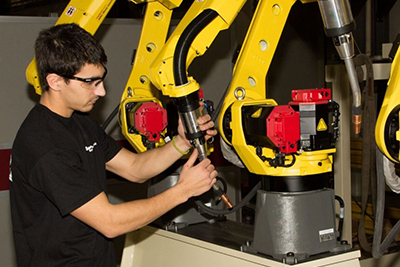What To Look For in A Robotic System Integrator
Whether you're a first-time robot buyer or have previously invested in automation, choosing the right robotic system integrator is crucial for your next project. But how do you identify the best fit? A reliable integrator can make all the difference between a successful automation project and one that falls short of expectations. A good robotic system integrator doesn't just install robots—they act as a strategic partner throughout the entire process. They assess your facility's needs, help design a tailored automation solution, and ensure smooth implementation. Their expertise can significantly improve your production efficiency, reduce downtime, and lower long-term costs. From assembly lines to material handling, palletizing, welding, and coating, robotic integrators can automate a wide range of processes. Their role is to bridge the gap between technology and real-world application, ensuring your systems are both effective and scalable. 1. Experience and Reputation Matter
Not all integrators are created equal. Some may have only limited experience, while others specialize in complex industrial environments. Choose an integrator with a proven track record in your industry. Ask for case studies, references, and examples of past projects that match your specific needs. 2. Quality of Solutions Is Critical
A strong integrator will not only offer products but also provide thoughtful, customized solutions. They should be able to analyze your current workflows and suggest the most efficient ways to integrate robotics. This includes identifying pain points and proposing innovative approaches to overcome them. 3. Look for Comprehensive Planning
An experienced integrator will develop a detailed automation plan that aligns with your business goals. This plan should cover financial, technical, and safety requirements, and include strategies for maximizing productivity and minimizing downtime. 4. Strong Execution Capabilities Are Essential
Even the best plans need to be executed properly. Your integrator should have the skills to test, assemble, and optimize your robotic systems. After installation, they should conduct thorough testing, fine-tune performance, and provide hands-on training for your team. 5. Ongoing Support Is a Must
Automation is not a one-time project—it requires continuous support. Ensure your integrator offers post-installation assistance, including maintenance, troubleshooting, and updates. If you operate multiple locations, choose a provider with a broad network to ensure consistent service across all sites. At Genesis Systems, we offer 24/7 customer support to ensure your robotic systems run smoothly at all times. Whether it’s a quick fix or a major upgrade, our team is always ready to assist. phosphates,NH4H2PO4,Inorganic compounds,Inorganic salt compounds,White crystalline powder MIANYANG KEJIXIN TRADING CO., LTD , https://www.kjxnitrate.comWhat to Look for in a Robotic System Integrator

Why You Need a Robotic System Integrator
Key Factors to Consider When Choosing an Integrator